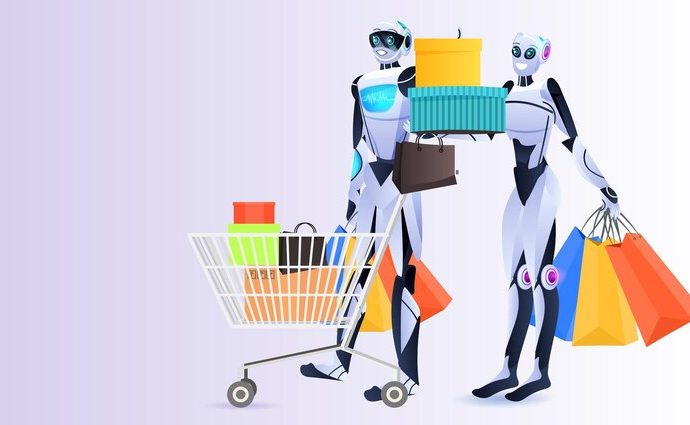Are you tired of the same old shopping experience? Do you ever wish your online retailers knew exactly what you wanted before you even did? Well, get ready to be amazed because artificial intelligence (AI) is transforming e-commerce as we know it. From personalized recommendations to virtual assistants and chatbots, machine learning is reshaping retail
Are you tired of the same old shopping experience? Do you ever wish your online retailers knew exactly what you wanted before you even did? Well, get ready to be amazed because artificial intelligence (AI) is transforming e-commerce as we know it. From personalized recommendations to virtual assistants and chatbots, machine learning is reshaping retail in ways we never thought possible. In this blog post, we will explore the rise of AI in e-commerce and how it’s changing the game for both consumers and businesses alike. Get ready for a new level of shopping experience!
The Evolution of AI in E-commerce
The evolution of AI in E-commerce can be traced back to the early days of online retail when basic recommendations were made based on purchase history. This soon progressed to more sophisticated personalization based on user behavior and preferences. The next major evolution came with the introduction of machine learning, which allowed for even more personalized recommendations as well as automated customer support.
Today, AI is playing an increasingly important role in e-commerce, powering everything from chatbots to product recommendations. And with the rapid advances in technology, it’s only going to become more important in the years to come. Here’s a look at how AI is currently being used in e-commerce and how it’s likely to evolve in the future.
One of the most common applications of AI in e-commerce is product recommendations. By analyzing past purchase history and user behavior, machine learning algorithms can make highly personalized recommendations for what products a user might be interested in. This not only helps improve the customer experience but can also lead to increased sales for businesses.
Another area where AI is having a big impact is customer support. Chatbots powered by AI are becoming increasingly common as they are able to provide fast and accurate responses to common questions. In many cases, they are even able to handle more complex inquiries and escalate them to human customer service representatives when necessary.
AI is also being used for fraud detection in e-commerce. By analyzing patterns in data, machine learning algorithms can identify suspicious activity and flag it
How Machine Learning is Reshaping Retail
Over the last few years, machine learning has become one of the most talked-about topics in the tech world. And for good reason: machine learning is already having a profound impact on many industries, including retail.
In retail, machine learning is being used to personalize the shopping experience for customers, track and predict inventory levels, optimize pricing, and more. In other words, machine learning is helping retailers to be more efficient and effective in their operations. And as machine learning technology continues to evolve, we can only expect that its impact on retail will continue to grow.
So how is machine learning reshaping retail? Here are just a few ways:
Personalized shopping experiences: Machine learning can be used to collect data about customer preferences and then use that data to personalize the shopping experience for each individual customer. This could include things like showing relevant products and recommendations based on previous purchases or browsing behavior.
Inventory management: Machine learning can be used to predict demand for certain products and then adjust inventory levels accordingly. This could help retailers avoid stockouts or overselling of items.
Pricing optimization: Machine learning can be used to analyze historical data to identify patterns in customer behavior with regards to pricing. This information can then be used to optimize pricing strategies going forward.
These are just a few examples of how machine learning is reshaping retail for the better. As this technology continues to evolve, we can only expect even more innovative applications of
The Benefits of AI in E-commerce
Artificial intelligence (AI) and machine learning are revolutionizing the e-commerce industry. Online retailers are using AI to personalize the shopping experience for each customer, recommend products, and improve customer service. Here are some of the benefits of AI in e-commerce:
1. Personalized Shopping Experiences
AI enables online retailers to personalize the shopping experience for each customer. By analyzing past purchase history, browsing behavior, and other data points, AI can recommend products that a customer is more likely to buy. This personalized approach leads to higher conversion rates and repeat customers.
2. Improved Product Recommendations
In addition to personalizing the shopping experience, AI can also be used to improve product recommendations. By analyzing customer data, AI can identify patterns and trends that allow retailers to recommend similar or related products. This helps shoppers find the products they need and encourages them to try new things.
3. Enhanced Customer Service
Online retailers are using AI to enhance customer service in a number of ways. Chatbots powered by AI can handle simple customer service tasks like answering FAQs or providing product information. These chatbots are available 24/7 and can help resolve issues quickly without requiring human intervention. In addition, AI can be used to analyze customer sentiment in order to proactively address negative experiences.
The Risks of AI in E-commerce
The rapid growth of artificial intelligence (AI) is reshaping industries across the globe, and e-commerce is no exception. Online retail giant Amazon was one of the first movers in AI, using machine learning to power its highly successful recommendation engine. Today, AI is being used by e-commerce companies to personalize the shopping experience, automate customer service, and even predict consumer behavior.
While AI promises many benefits for e-commerce businesses, there are also risks associated with its adoption. One of the biggest concerns is that AI will lead to job losses as automation increasingly takes over tasks currently performed by human workers. Additionally, there is a risk that AI will be used to manipulate consumer behavior, through targeted ads and personalized recommendations that nudge shoppers towards certain products. Privacy concerns are also a major concern, as e-commerce companies collect increasing amounts of data on their customers. Finally, there is a risk that AI systems will become biased and discriminatory, if they are not properly trained and monitored.
Despite these risks, AI remains a powerful tool that can be used to improve the e-commerce experience for both businesses and consumers. By understanding the risks involved and taking steps to mitigate them, e-commerce companies can reap the rewards of AI while minimizing its potential harms.
Conclusion
As e-commerce continues to grow and evolve, the role of AI and machine learning becomes increasingly essential. The ability for machines to analyze data much faster than humans allows companies to provide more personalized experiences for their customers, leading to improved engagement and conversions. As these technologies become more commonplace in the retail industry, we can expect even greater efficiency and accuracy as they become ever more sophisticated. In this way, AI is set to revolutionize the entire ecosystem of online retailing moving forward into the future.





















Leave a Comment
Your email address will not be published. Required fields are marked with *